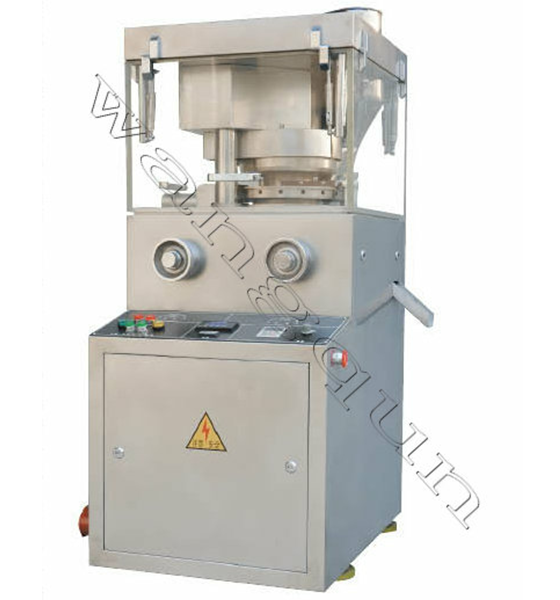rotary tablet press Maintenance Guide for Pharmaceutical Manufacturers
A rotary tablet press is a critical machine in pharmaceutical production, enabling high-efficiency and precise tablet manufacturing. Proper maintenance and adherence to quality standards ensure consistent tablet output, reduce downtime, and extend the machine’s lifespan. This guide provides an in-depth overview of performance characteristics, inspection standards, quality reports, and technical support for pharmaceutical manufacturers seeking optimal operation of rotary tablet presses.
Table of Contents
Overview of Rotary Tablet Press
Performance Characteristics
Inspection Standards and Quality Control
Quality Inspection Reports
Maintenance and Troubleshooting Guide
Technical Support and After-Sales Services
Applications in Pharmaceutical Manufacturing
Conclusion
1. Overview of Rotary Tablet Press
A rotary tablet press compresses powders and granules into uniform tablets using a rotary turret with multiple compression stations. It is widely used in the pharmaceutical, nutraceutical, and supplement industries. Key advantages include:
High-capacity production: Capable of producing tens of thousands of tablets per hour
Consistent tablet quality: Ensures uniform weight, size, and hardness
Adjustable parameters: Compression force, turret speed, and fill depth can be customized
Safety features: Emergency stop systems, protective shields, and interlocks
Digital controls: Real-time monitoring of production parameters

2. Performance Characteristics
Understanding the performance characteristics of rotary tablet presses is critical for proper maintenance and troubleshooting:
| Feature | Description | Benefit |
|---|
| Compression Force | Adjustable 30–80 kN (depending on model) | Enables consistent tablet hardness |
| Turret Stations | 10–17 stations per turret | Supports high-capacity production |
| Tablet Size Range | 5–25 mm diameter | Allows flexibility for multiple formulations |
| Fill Depth Adjustment | 2–15 mm | Ensures precise tablet weight |
| Control System | Digital display with PLC interface | Monitors real-time performance |
| Safety Mechanisms | Emergency stop, interlocks, protective shields | Protects operators and equipment |
Key maintenance implications: Higher compression forces require frequent inspection of punches and dies, and digital controls need regular calibration to maintain accuracy.
3. Inspection Standards and Quality Control
Pharmaceutical manufacturers must follow strict inspection standards to maintain GMP compliance:
3.1 Routine Inspections
Daily: Check hopper, feeder system, punches, dies, and turret alignment
Weekly: Inspect lubrication systems and motor function
Monthly: Examine hydraulic and electrical systems
3.2 Quality Control Parameters
Tablet Weight Variation: ±5% of target weight
Tablet Hardness: As per formulation requirements
Thickness: ±0.2 mm tolerance
Friability: Less than 1% weight loss per USP guidelines
3.3 Documentation
Maintaining inspection logs and calibration records is essential for regulatory audits and traceability.
4. Quality Inspection Reports
Quality inspection reports provide detailed evidence of machine performance and tablet quality:
| Report Type | Content | Frequency |
|---|
| Daily Production Log | Tablet count, weight, hardness | Daily |
| Punch & Die Inspection | Wear, alignment, lubrication status | Weekly |
| Calibration Record | Digital control system, pressure settings | Monthly |
| Maintenance Report | Completed maintenance tasks, replacement parts | Monthly/Quarterly |
| Regulatory Compliance Report | GMP compliance, QC testing results | As required |
Maintaining these reports ensures consistent quality and regulatory adherence, and helps identify trends requiring preventive maintenance.
5. Maintenance and Troubleshooting Guide
Proper maintenance is essential to maximize machine efficiency and reduce downtime:
5.1 Preventive Maintenance
Daily: Clean hopper, punches, and turret; check lubrication
Weekly: Inspect punches, dies, feeder system; tighten loose components
Monthly: Check hydraulic pressure, motor function, and turret alignment
Quarterly: Full system inspection, including electrical and digital controls
5.2 Common Troubleshooting Issues
| Problem | Possible Cause | Solution |
|---|
| Uneven tablet weight | Improper fill depth or powder inconsistency | Adjust feeder, check powder flow |
| Cracked or chipped tablets | Excessive compression force | Reduce pressure, align punches |
| Sticking tablets | High moisture content or insufficient lubrication | Dry powder, lubricate punches and dies |
| Machine vibration | Loose components or uneven floor | Tighten bolts, level base |
| Reduced output | Worn punches or dies | Replace components, inspect turret alignment |
6. Technical Support and After-Sales Services
Reliable technical support is essential for maintaining optimal rotary tablet press performance:
Remote Assistance: Troubleshooting via video calls or digital monitoring
On-Site Service: Installation, calibration, and maintenance support
Spare Parts Supply: Availability of punches, dies, and electronic components
Operator Training: Safety, operational best practices, and maintenance procedures
Documentation Support: Maintenance logs, calibration certificates, and QC templates
Many manufacturers also offer upgrade services, including digital control system enhancements, energy-saving motor upgrades, and automated lubrication systems.
7. Applications in Pharmaceutical Manufacturing
Rotary tablet presses are used across a variety of pharmaceutical applications:
Prescription Tablets: Painkillers, antibiotics, cardiovascular medications
Over-the-Counter Drugs: Vitamins, antacids, analgesics
Herbal and Nutraceutical Tablets: Herbal supplements, probiotics
Veterinary Tablets: Animal health medications
Food and Chemical Tablets: Effervescent tablets, vitamin candies, and chemical dosing tablets
The versatility of rotary tablet presses allows manufacturers to produce high-quality tablets across multiple industries while maintaining regulatory compliance.
8. Conclusion
A rotary tablet press is a vital machine for high-efficiency, reliable, and precise tablet production in pharmaceutical manufacturing. By following this maintenance guide, manufacturers can ensure:
Consistent tablet quality
Reduced downtime and repair costs
Extended machine lifespan
Compliance with GMP, FDA, and ISO standards
Enhanced operator safety and efficiency
Regular inspections, preventive maintenance, and adherence to quality control standards are essential for maximizing production efficiency and maintaining regulatory compliance. With proper technical support and a well-structured maintenance plan, rotary tablet presses can deliver long-term reliability and high-quality tablet output.











 Phone
Phone
Comment
(0)